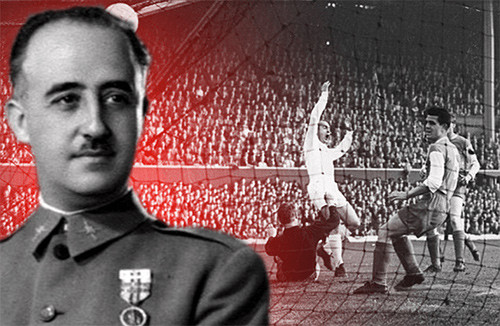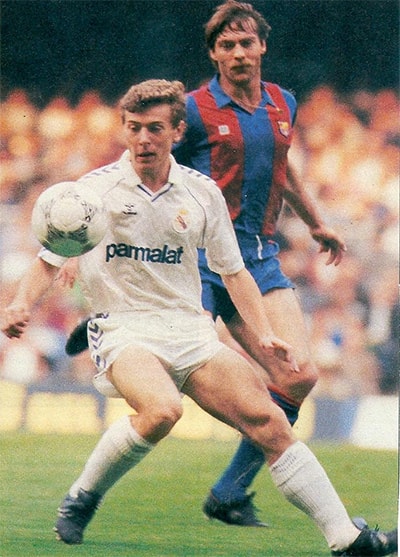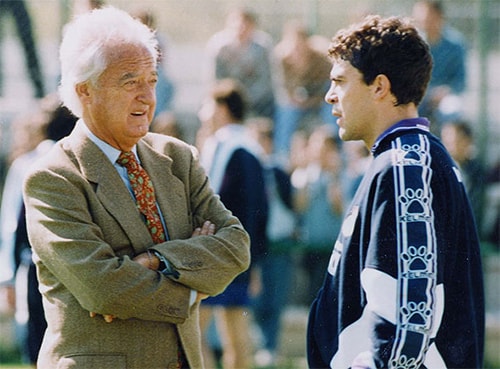Why is Real nicknamed 'White Vulture'?
'The White Vulture' is a familiar nickname for Real, but few people know that behind it is a whole historical story of the club itself as well as Spanish football.
In November 1975, dictator Franco died after nearly 40 years of power in Spain. Real Madrid's history is closely linked to Franco, as their success came mainly after the end of the Spanish Civil War in 1939. And Franco's death also coincided with the Royal team's rapid decline in the 1980s. That was also the time when Johan Cruyff came to Catalonia to play for Barcelona.
 |
After the fall of the Franco dictatorship, Real Madrid entered a period of severe crisis. |
As a result, Barca won against Real on the pitch, and in politics, the wind of democracy swept through the country. The first civilian government was elected after half a century of oppression under the Franco dictatorship. That wind of change contributed to cleansing the Spanish people's minds after many years of oppression under the dictatorship, and thanks to that, football life was also richer and more open.
These are important premises for the emergence of the new generation."Quinta del Buitre" - also known as "The White Vulture" in Real.
This phrase is used to describe five players who came through Real's Castilla academy, and all have Madrid roots. The five boys are: Manuel Sanchis, Miguel Pardeza, Michel, Martin Vazquez and Emilio Butragueno. Of these, Butragueno is considered a symbol of Real's splendor and elegance on the pitch.
Before it became the nickname for the entire generation of five and the club, "The Vulture" (El Buitre) was Butragueno's nickname. This nickname was used by fans to describe his killer instinct on the pitch.then. Butragueno and his peers were born in the era of Alfredo di Stefano, Ferenc Puskas, Gento, and witnessed Real's absolute domination of Europe. Therefore, for them, there was no greater pain than having to witness the rise of Barca.
 |
"The White Vulture" comes from "The Vulture" - the nickname Real fans gave Butragueno because of his goal-scoring instinct. |
But besides the talent of the "homegrown" stars from Madrid mentioned above, "Los Blancos" probably could not have taken off and shown their instinct to hunt for titles, without a special character - Ramon Mendoza.
In the first half of the 1980s, Real was in a serious crisis with five consecutive years without a trophy - an unacceptable thing for the great tradition of this club. Change only came when Ramon Mendoza appeared as President in 1985. According to the description of the famous writer Gabriele Marcotti, before the time Florentino Perez appeared (in 2000), Mendoza's influence was second only to Santiago Bernabeu.
Mendoza is a controversial businessman, a left-winger, and a conservative at Real Madrid. He has been criticised for using the club’s image for political purposes – a point that has drawn comparisons with his two close friends, famous Italian owners Silvio Berlusconi (AC Milan) and Gianni Agnelli (Juventus).
To win over Real's members, Mendoza aimed to regain the Madrid essence that had faded over the years. And instead of spending money to bring in international stars, the policy of "Madridizing" the team, promoting the capital's talents who grew up in Real's own training academy was a historic turning point for the club to regain its dominant position.
 |
Mendoza's (left) trust in homegrown players like Sanchis (right) was the foundation for Real Madrid's later success. |
"We are all young people from Madrid, with the same views on how to play football, all wanting to play offensively regardless of the risks we face," Manuel Sanchis confided when talking about the football philosophy of the "White Vulture" generation.
When it comes to football culture in Spain during this period, you may have heard of the Spanish national team’s nickname, La Furia Roja (The Red Storm). That nickname comes from the Spanish national team being influenced by the fierce, physical style of English football that originated in the Basque country and spread throughout the football world.
It was an ugly and brutal style of play, most notably the 1983 felling of Diego Maradona by "executioner" Andoni Goikoetxea. Invisibly, that style of football also represented a Spain ruled by violence and guns. The situation was so bad that the then Barca coach Cesar Menotti commented: "Only when the Spanish become gladiators, instead of bulls, will they start winning on the pitch."
And with the "White Vulture" generation, especially Emilio Butragueno, the Spanish people suddenly saw rays of hope to revive the country from the football field. In the book Morbo, historian Phil Ball used the word "Master" to describe Butragueno's "First touch" technique. Thanks to his skillful technique, Butragueno seemed to turn the narrowest spaces into his own football field.
Talking about Butragueno just using the number of goals is not enough. Butragueno's face has the innocent look of Peter Pan, his movements are rhythmic like Flamenco dance, but Phil Ball describes that behind that is a cold-blooded "killer" with a sharp sword, just the smallest opportunity, Butragueno will easily finish off the opponent. For the Spaniards, he has realized the dream of an "El Matador" (the gladiator) instead of bulls on the field.
* Butragueno's talent when he was playing for Real Madrid.
With Butragueno and four of his peers as pillars, that generation of "White Vultures" helped Real regain five consecutive La Liga championships (from 1986 to 1990), besides creating a luxurious and beautiful football style that became the identity of the Royal team. If there is anything more regrettable about this generation, it is that they could not win the C1 Cup once.
Real's history is written by great people, from the cunning Santiago Bernabeu, to the bravery of Alfredo Di Stefano on the pitch. And the tradition is worthily inherited by the next generation like Butragueno's "White Vultures" - the second greatest generation in the history of this team. More than that, they are the children of Madrid, who have shaped the playing style and outlook on life for a whole new generation of democratic Spain.
According to VNE
| RELATED NEWS |
|---|

